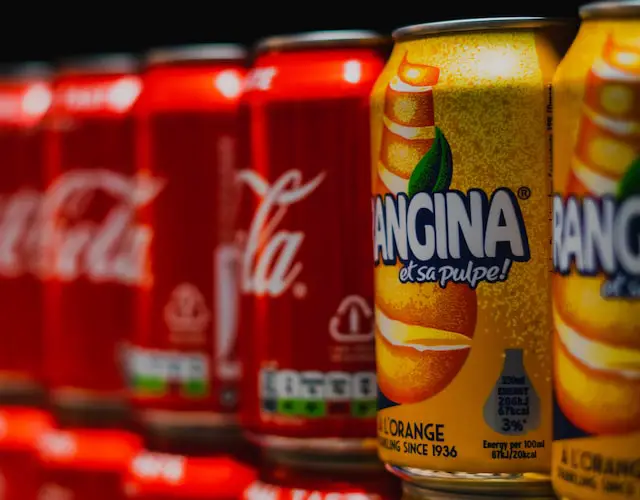Aerated drinks are made by adding air to the beverage, while carbonated drinks are made by adding carbon dioxide. Carbonated beverages tend to be fizzy and have a slightly acidic taste, while aerated drinks are usually not as fizzy and have a sweeter taste.
What are carbonated drinks?
(Photo by Caspar Rae on Unsplash )

Carbonation is the process of adding carbon dioxide to a liquid,
these drinks are those that have been saturated with carbon dioxide gas under pressure. which creates bubbles of carbon dioxide gas. This is what gives soda its fizzy texture. Carbonation can also occur naturally in some liquids, like sparkling water.
Carbonated drinks, tend to be bubbly and effervescent. Carbonated drinks, are often very fizzy and can sometimes be too much for some people.
What are aerated drinks?
(Photo by Tomasz Rynkiewicz on Unsplash )

Aerated drinks are those that have been infused with carbon dioxide, resulting in a fizzy, refreshing beverage. Aerated drinks tend to be less carbonated than their carbonated counterparts. This results in a drink that is less fizzy and more refreshing.
The Difference between Aerated and Carbonated Drinks
The main difference between aerated and carbonated drinks is their carbonation source. Aerated drinks are artificially carbonated while carbonated drinks are naturally carbonated. Another difference between the two is their sugar content. Aerated drinks contain a large amount of sugar, while carbonated drinks typically have less sugar.
Key differences between aerated and carbonated drinks?
Aerated and carbonated drinks are similar in that they both contain carbon dioxide gas, which gives them their distinctive bubbles and fizz. However, there are several key differences between the two:
- Carbonation method: Aerated drinks are carbonated by injecting pressurized carbon dioxide into the liquid, while carbonated drinks are carbonated through a natural carbonation process.
- Sugar content: As mentioned earlier, some carbonated drinks have no added sugar, while many aerated drinks contain high amounts of sugar.
- Flavor: Carbonated drinks often have a mild, crisp taste, while aerated drinks are often sweet and flavored.
- Caffeine content: Some carbonated drinks, such as cola, contain caffeine, while others do not. Aerated drinks, on the other hand, typically do not contain caffeine.
- Acidity: Carbonated drinks are typically less acidic than aerated drinks.
- Carbonation level: The level of carbonation can also differ between the two types of drinks. Carbonated drinks are often highly carbonated, while aerated drinks may have a more moderate level of carbonation.
Health impact: While both aerated and carbonated drinks can have negative effects on health if consumed in excessive amounts, carbonated drinks are generally considered to be less harmful due to their lower sugar content.
What are the benefits and drawbacks of carbonated drinks?
Benefits of Carbonated Drinks:
- Hydration: Carbonated water can be a good source of hydration, especially for those who do not like the taste of plain water.
- Refreshing taste: The bubbles and fizz in carbonated drinks can provide a refreshing taste and can help to quench thirst.
- Improved digestion: Some people find that drinking carbonated water can improve digestion and reduce bloating.
- Lower sugar content: Many carbonated drinks, such as soda water, have no added sugar, which can be beneficial for people who are trying to limit their sugar intake.
Drawbacks of Carbonated Drinks:
- Tooth decay: The high acidity levels in carbonated drinks can lead to tooth decay and enamel erosion.
- Dehydration: Although carbonated water can be a good source of hydration, it can also have a dehydrating effect if consumed in excessive amounts.
- Caffeine content: Some carbonated drinks, such as cola, contain caffeine, which can have negative effects on health if consumed in excessive amounts.
- Artificial sweeteners: Some carbonated drinks contain artificial sweeteners, which have been linked to a number of health problems, including headaches, weight gain, and digestive issues.
- Empty calories: Carbonated drinks that contain sugar or artificial sweeteners can provide empty calories that can lead to weight gain and other health problems.
Overall, it’s important to consume carbonated drinks in moderation and to opt for those with lower sugar content and no added artificial sweeteners. Additionally, drinking water, which does not contain sugar, caffeine, or artificial sweeteners, is the best option for hydration.
What are the benefits and drawbacks of aerated drinks?
Benefits of Aerated Drinks:
- Sweet taste: Aerated drinks are often sweet and flavored, making them a popular choice for those who have a sweet tooth.
- Energy boost: Some aerated drinks, such as energy drinks, contain caffeine, which can provide a quick energy boost.
- Hydration: Aerated drinks can provide hydration, especially for those who do not like the taste of plain water.
Drawbacks of Aerated Drinks:
- High sugar content: Many aerated drinks contain high amounts of sugar, which can lead to weight gain, obesity, and other health problems.
- Tooth decay: The high sugar content in aerated drinks can lead to tooth decay and enamel erosion.
- Dehydration: Aerated drinks can have a dehydrating effect if consumed in excessive amounts, especially if they contain caffeine.
- Caffeine content: Some aerated drinks contain high levels of caffeine, which can have negative effects on health if consumed in excessive amounts.
- Artificial flavors and colors: Aerated drinks often contain artificial flavors and colors, which have been linked to a number of health problems, including headaches and digestive issues.
- Empty calories: Aerated drinks can provide empty calories that can lead to weight gain and other health problems.
Overall, it’s important to consume aerated drinks in moderation and to opt for those with lower sugar content and no added artificial flavors or colors. Drinking water, which does not contain sugar, caffeine, or artificial ingredients, is the best option for hydration.
What are non-carbonated drinks?
Non-carbonated drinks, also known as still drinks, are beverages that do not contain bubbles or carbon dioxide. Unlike carbonated drinks, which have a fizzy and effervescent texture, non-carbonated drinks have a smooth and still texture. Some examples of non-carbonated drinks include:
- Water: This is the most basic and essential non-carbonated drink, and it is essential for good health.
- Juice: Juices are made from fruits and vegetables, and they come in many different flavors and varieties. Some juices are made from 100% pure fruit or vegetable juice, while others contain added sugars and preservatives.
- Milk: Milk is a nutritious and hydrating drink that provides a variety of essential vitamins and minerals, including calcium and vitamins D and B12.
- Tea: Tea is a popular non-carbonated drink that comes in a variety of flavors and varieties, including green tea, black tea, and herbal tea.
- Coffee: Coffee is another popular non-carbonated drink that provides caffeine and antioxidants.
- Sports drinks: Sports drinks are designed to provide hydration and electrolytes for athletes, and they often come in a variety of flavors.
- Smoothies: Smoothies are blends of fruits, vegetables, and other ingredients that are typically consumed for their nutritional value and taste.
Non-carbonated drinks can be a healthy alternative to carbonated drinks, especially for those who are trying to limit their sugar and caffeine intake. Drinking plenty of water is the best way to stay hydrated, and choosing non-carbonated drinks with no added sugars or artificial ingredients can help you maintain good health.
Can carbonated drinks cause bloating?
Yes, carbonated drinks can cause bloating in some individuals. The carbon dioxide in carbonated drinks forms bubbles in the stomach, which can lead to bloating, gas, and discomfort. This happens because the carbon dioxide can’t be fully absorbed by the body, so it builds up in the stomach, causing it to expand and leading to feelings of fullness and bloating.
Additionally, carbonated drinks often contain high levels of sugar, which can also contribute to bloating and other digestive issues. The sugar in carbonated drinks can ferment in the gut, leading to the production of gas and bloating.
If you’re prone to bloating, it’s a good idea to limit your consumption of carbonated drinks, or avoid them altogether. Instead, try drinking non-carbonated drinks such as water, tea, or 100% fruit juice. Drinking plenty of water can also help to reduce bloating by keeping your digestive system moving and flushing out excess gas. If you’re experiencing persistent bloating or other digestive issues, it’s best to speak with a doctor to determine the cause and find the best course of treatment.
Are aerated drinks bad for your health?
Aerated drinks, which are also known as carbonated or soda drinks, can have a negative impact on your health if consumed in excess. While these drinks can be a source of sugar and caffeine, which can provide a quick burst of energy, they are often high in calories and low in nutritional value. Overconsumption of aerated drinks can lead to a variety of health problems.
Is carbonation natural or artificial?
Carbonation can be both natural and artificial.
Natural carbonation occurs when carbon dioxide (CO2) is naturally dissolved into a beverage, such as water, under pressure. This can occur naturally in underground springs, or as a result of fermentation in drinks like beer and sparkling wine.
Artificial carbonation, on the other hand, is created by adding CO2 gas to a beverage using pressurized tanks or carbonation machines. This process is commonly used to produce carbonated soft drinks and other artificially carbonated beverages.
While natural carbonation can be seen as more desirable by some consumers, both forms of carbonation can have similar effects on the body, such as causing bloating and gas. The key difference between natural and artificial carbonation is how the CO2 is dissolved into the beverage.
How do you know if a drink is carbonated or aerated?
A drink is considered carbonated or aerated if it contains dissolved carbon dioxide gas. This gas creates the bubbles and fizz that are characteristic of carbonated drinks.
There are a few ways to determine if a drink is carbonated:
- Appearance: Carbonated drinks typically have bubbles rising to the surface and a visible fizz.
- Taste: Carbonated drinks have a distinctive taste that is often described as crisp and effervescent.
- Mouthfeel: When you drink a carbonated beverage, you may notice a tingling or fizzing sensation in your mouth.
Packaging: Carbonated drinks are often packaged in cans or bottles that are designed to withstand pressure and keep the carbon dioxide gas dissolved in the drink.
If you’re unsure if a drink is carbonated or aerated, you can also check the ingredients label for any mention of carbon dioxide gas or carbonation. Additionally, you can try shaking the drink and observing if any bubbles form or the drink becomes frothy. If you do see bubbles or froth, it’s likely that the drink is carbonated or aerated.
Featured Image By – Pille R. Priske on Unsplash








